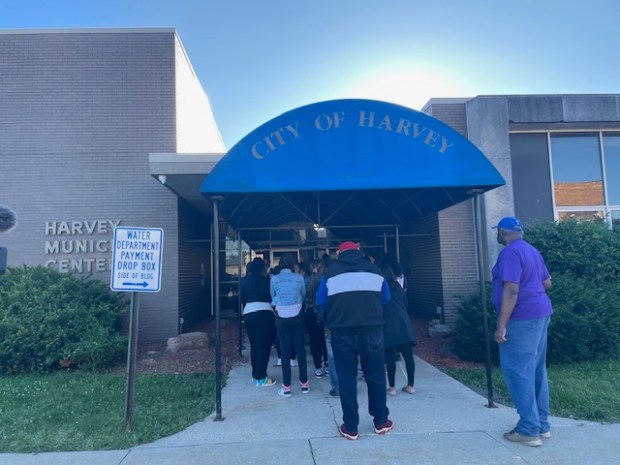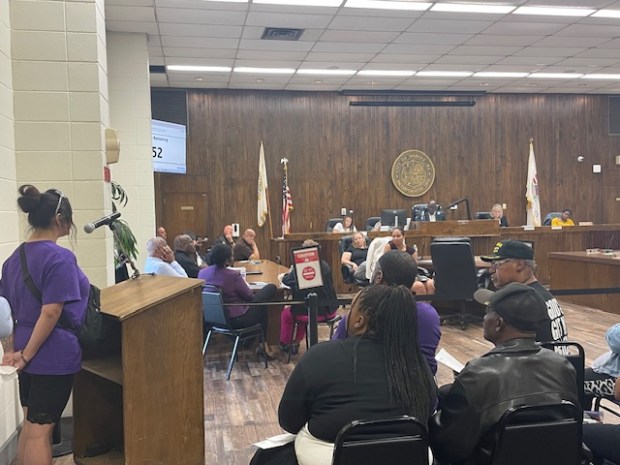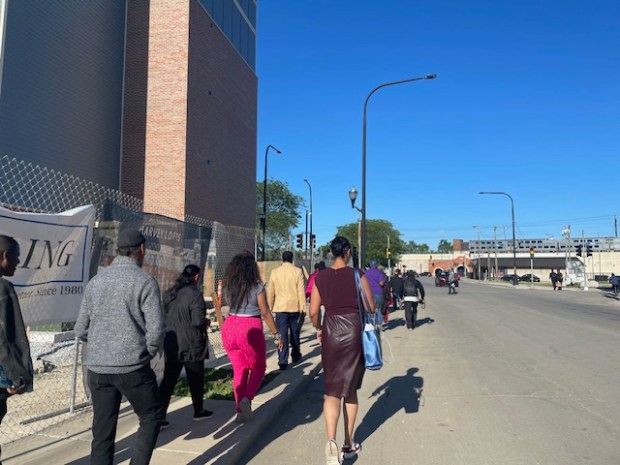Tension in Harvey was heightened Monday as close to 50 business owners and residents marched to the city municipal building to protest fines, fees and the holding back of licenses.
Business owners said their licenses were not being issued if they did not pay at least $2,500 in fines for delinquent property taxes, pastors were outraged over a Harvey law requiring churches to obtain business licenses and residents protested a water rate hike.
Protesters marched from Transformation Community United Methodist Church to the municipal building before the monthly City Council meeting.
Residents and business owners called for an investigation into Mayor Christopher Clark’s administration and its business dealings, chanting in unison “stop the extortion” and “where is the money?”
Harvey business owner Benecia Gonzalez, one of the organizers, said the chants were in response to settlement agreements offered to businesses with delinquent property taxes.
The City Council passed an ordinance in January to deny operating licenses to businesses that owe property taxes.
Clark said the city collects 52% of its property tax revenue, and some businesses have evaded property tax payments for up to 20 years, costing the city $25 million a year in tax revenue with roughly $12 million from overdue property taxes.
Clark said the city also loses 35% of all sales tax revenue to the state because of unpaid Police and Fire department pensions, an issue he says he inherited from his predecessor.
Ald. Colby Chapman marches with Harvey residents toward the city municipal building Monday to protest water bill hikes, business license withholding and a church license ordinance. (Samantha Moilanen/Daily Southtown)
Businesses with overdue taxes who choose to operate without a license are being presented with a settlement agreement allowing them to sidestep fines of up to $2,500 per day and continue to run their business while they determine how to settle the property tax debt.
Harvey’s 2nd Ward Ald. Colby Chapman said the decision to offer a settlement agreement was not presented to the City Council for a vote.
“Certainly an agreement of any sort where the city of Harvey is recouping dollars for something should have been presented in front of the council,” Colby said.
Delinquent business owners can pay a $2,500 down payment plus an additional $2,500 a month, eventually totaling $30,000; two installments of $12,000 for the year totaling $24,000; or $20,000 for the entire year up front, according to a copy of an agreement obtained by the Daily Southtown.
“We tried to find a way that, in lieu of prosecution, we would be able to allow them to stay open, but they would have to pay some type of fine as a result, and that way we didn’t have to continually charge them $2,500 a day,” Clark said.

Protesters wait to enter the Harvey municipal building before Monday’s City Council meeting. (Samantha Moilanen/Daily Southtown)
But some residents at Monday’s meeting expressed confusion and frustration over the settlement and withholding of operating licenses.
Gonzalez said she inherited her grandfather’s auto shop along with years of late property tax bills when she was 20. Gonzalez, now 24, said the city ordered her auto shop to close in May due to outstanding property taxes, shortly after she applied to renew her business license.
The city’s planning department reviews business licenses and all renewal documents are due at the end of April, according to a city ordinance. Failure to renew a license by the deadline will result in a daily $2,500 fine, according to the license renewal policy letter for 2023-24 applications.
“All we want to do is provide for our families,” Gonzalez told the City Council. “We feel like we have nothing to lose anymore.”
Gonzalez said when she went to city officials to plead her case, she was given the settlement agreement, which she has not accepted.

Harvey business owner Benecia Gonzalez, 24, addresses the City Council over orders to close her auto shop due to overdue property taxes. (Samantha Moilanen/Daily Southtown)
Business owners who had accepted the settlement deal expressed frustration Monday that their business licenses were still being withheld.
Clark said by law, the city cannot award licenses to any business with outstanding property taxes. He said the settlement agreement is a way for businesses to avoid these fines, but also give back to the city in some form.
Clark said he made efforts to inform business owners and residents about the settlement agreement option before licenses were due for renewal.
“We were hopeful that the businesses would take advantage of it so much so that I had my team send a letter out to the businesses to let them know that this was available for them,” Clark said.
Clark said the money from the settlement does not go toward a business owner’s outstanding property tax balance, but gives them time to determine how to pay back their dues.
Business owners said even if they wanted to take the settlement, they cannot afford $2,500 a month.
Other protesters spoke out against a city ordinance requiring charitable organizations and churches to acquire business licenses.
The Rev. Johnathan Johnson, a pastor at Holy Bible Missionary Baptist in Harvey, said he is frustrated because the business license his church applied for over two months ago is still under review.
“They have not given us a word as to where they are with the review,” Johnson said. “And we’re not a business. We’re a charity. We operate solely off of donations, not profits.”
Clark said he has made an effort to communicate his agenda and invite open discussion, but residents and elected officials say there has not been enough transparency regarding how city money is being spent.
Colby expressed her ongoing efforts to obtain information from the city regarding the transition from the annual treasurer’s report, which provides a detailed breakdown of government expenditures and revenues, to the comptroller’s report, offering a more comprehensive view of the city’s financial well-being. She said she has yet to receive any responses.
The city has not released a yearly treasurer’s report since 2022, but recently published a comptroller’s report in March, Colby said.
“The residents need to know what’s going on,” she said. “This is very important that as an administration, we can be heard like our minority voice means something, even if it’s not a part of the majority vote. But we must be heard.”
smoilanen@chicagotribune.com



